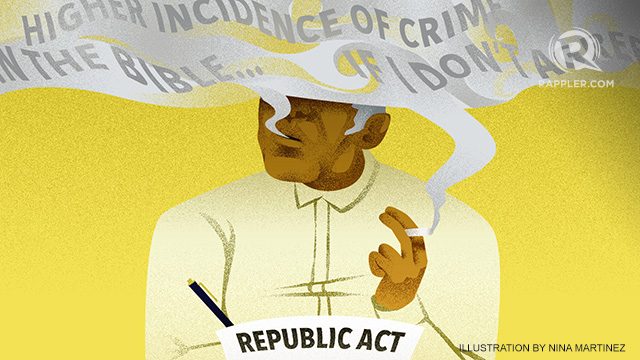SUMMARY
This is AI generated summarization, which may have errors. For context, always refer to the full article.

The Philippines is currently in the midst of a new, dangerous wave of policymaking: one that relies not so much on verifiable facts and data, but more on emotions, gut feeling, and beliefs.
Of course, policymaking has always been infused with some degree of subjectivity. But it’s quite alarming when policymakers start using “alternative facts” in their arguments, especially on the most contentious policy issues of the day.
In what follows, we list down major examples of this type of policymaking in recent times and explore their implications. We also try to debunk some of the misinformation along the way.
Gut feeling
The use of gut feeling in policymaking is nowhere more manifest than in the death penalty debates and the President’s war on drugs.
In the recent House debates on the reimposition of the death penalty, Representative Lawrence Fortun cited official data showing the decrease of crime rates in recent years. In response, the House justice committee chair, Representative Reynaldo Umali, said that the Supreme Court had previously ruled that such statistics are “not necessary” to re-impose the death penalty.
Rep Umali added: “If you will just read the papers, watch television, and/or listen to radio on a daily basis, you will hear that these crimes are committed left and right. And to me, that is how to view that there is a compelling reason for the reimposition of the death penalty.”
Indeed, the Supreme Court had ruled before that “a positive manifestation…of a higher incidence of crime” need not be proven to validate the reimposition of the death penalty.
But in a recent article, Kevin Mandrilla and I showed data that the death penalty, as used before, had dire consequences: not only was it ineffective, it was also anti-poor and error-prone.
By disregarding these facts and relying on perception and outrage, we risk putting so many innocent lives on death row to deter a crime wave that’s not coming.
While the death penalty has yet to do damage anew, President Duterte’s war on drugs has already resulted in more than 7,000 deaths in the past 7 months. Time and again, he has justified this aggressive drug war by saying that between 3 to 4 million Filipinos are currently addicted to drugs.
However, the Dangerous Drugs Board put the number of drug users nationwide at a much lower level of 1.8 million as of 2015. Before that, the same agency reported the figure to be just 1.3 million in 2012 and 1.7 million in 2008.
By all accounts, the President’s drug war seems to be an overreaction to the country’s drug problem. Contrary to the empirical estimates, the country’s drug problem is not as big as what the government is portraying.
By ignoring the facts and letting our fears and anger get the better of us, we ended up deploying so much government resources in an unwinnable drug war that already killed more than 7,000 Filipinos. This is one example where conjuring “alternative facts” literally had deadly consequences.

Beliefs
Personal beliefs and convictions are also playing a more prominent role in recent policy debates.
For instance, Senator Manny Pacquiao recently invoked Bible passages to justify the death penalty. He said: “God gave the government the right to use capital punishment. Jesus Christ was even sentenced to death because the government called for it.” (Wait, what?)
Regarding “cross-dressing,” Senator Pacquiao also said: “Even in the Bible, we can read na ang babae, dapat magsuot na pambabae; at ang lalaki, magsuot ng panlalaki (that women are supposed to wear womenswear, and men should wear menswear). That’s what I believe.”
Needless to say, blind religious belief has no place in modern policymaking. First, it’s impudent to impose one’s own beliefs on a policy that could affect Filipinos of all faiths. Second, Bible-based policymaking goes against the need for policies to be timely, responsive, and context-specific.
DENR Secretary Gina Lopez is also invoking deeply-held beliefs in her crackdown on the mining industry. On February 2, she announced the closure of 23 mining operations in the country, following an extensive mining audit by the Mines and Geosciences Bureau (MGB).
But when asked for a copy of the MGB’s recommendations, Sec Lopez said: “I’m gonna think about it, because if I don’t agree with it then I’m not gonna give it to you….If it’s not resonant with the principles on which DENR runs…why will I give it to you if I don’t agree with it?”
She added, “What I’m sharing with you are the principles on which I stand by, and I truly hope you share the same principles because you’re Filipino.”
First, her reluctance to divulge the full results of the mining audit flies in the face of basic principles of transparency and accountability. More importantly, the audit report must be made public regardless of its alignment with the Secretary’s personal convictions.
There’s no denying that certain mining activities have caused irreparable damage to many Filipinos and to our natural resources. But the fight against irresponsible mining should depend not so much on the convictions of the head of agency, but more on the capacity of our institutions to implement our laws and monitor mining activities.
Without a more strategic and sustainable approach, Sec Lopez’s drastic measures could easily be undone (or even backfire) once she’s out of office.
Conclusion: Let’s make facts matter again
Policymaking is akin to the way doctors treat their patients. In the same way that we expect our doctors to diagnose our condition correctly before they prescribe any medicine or therapy, we should expect our policymakers to thoroughly assess the state of the country’s problems before they enact any corrective policy.
When policymakers rely less on facts and more on their personal emotions and beliefs, they are no more different than quack doctors who blindly give out medical treatments that could turn out to be costly, ineffective, and even harmful.
How do we make facts matter again in Philippine policymaking?
First, we can use the basics of so-called “moral reframing.” When it comes to policy advocacy, knowing the facts no longer suffices. Instead, advocates should collect their facts and wrap them in stories, narratives, and anecdotes that will resonate with our policymakers and help them see the light.
Second, whenever politicians discuss public policy, they listen to public opinion. Hence, it behooves every one of us to call out our politicians – harshly, predictably, and consistently – whenever they state blatant falsehoods or distort facts in support of their causes.
Third, we should foster a new culture of fact-checking especially among today’s youth. With the spread of internet usage and mobile technologies, never has it been easier to check the facts. Only by relentlessly fighting misinformation can we prevent the country from retrogressing into a dark age of policymaking. – Rappler.com
The author is a PhD student and teaching fellow at the UP School of Economics. His views do not necessarily reflect the views of his affiliations. Thanks to Kevin Mandrilla for helpful comments and suggestions.
Add a comment
How does this make you feel?
There are no comments yet. Add your comment to start the conversation.